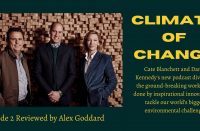Follow Marine Biologist Carl Safina as he takes viewers around the world to show us how today’s ocean issues are being solved in his PBS series “Saving the Ocean.” You can watch full episodes online at the PBS website. Here at A/J he’s giving us a behind the scenes look at each episode.
Follow Marine Biologist Carl Safina as he takes viewers around the world to show us how today’s ocean issues are being solved in his PBS series “Saving the Ocean.” You can watch full episodes online at the PBS website. Here at A/J he’s giving us a behind the scenes look at each episode.
We’re off the coast of Tanzania, East Africa. Collectively called Zanzibar, these islands are part of the “Swahili Coast.” The mainly Muslim sub-culture here has been deeply influenced by centuries of ocean-going sailing trade with Arabs.
We’re here to profile a new local effort by Islamic leaders to instill a conservation ethic in the residents and religious leaders of Pemba Island’s fishing villages.
This is a culture straddling several centuries at once. Power outages are daily, but many villages would never know – they don’t have electric lines. Or plumbing. Many houses are mud and thatch.
Our base is the town of Chake-Chake (pronounced cha’-kay cha’-kay). Our visit has been arranged with the help of the Misali Island Conservation Association, an improbable little local group that formed to fight off a planned tourist development on Misali Island. Fishers feared they’d lose access to the surrounding waters and that the intended resort would also cut the locals out of any tourism revenue. And as one local leader said, “We are concerned tourism will bring people who will leave garbage, and break corals.”
Around Pemba Island the boats, all wooden, are called dhows. They have one mast, one boom, and one triangular sail. The boom is hoisted to the top of the mast, then angled at about 45 degrees. The sails assume a perfect shape and fill without luffing, even in the merest breeze. They look like they were built centuries ago, and their design has probably changed little in thousands of years.
Many smaller dhows – mostly just dugout canoes fitted with mast and sail – work local waters. Much larger ones carry cargo along the coast. The people, heavily dependent on the sea for their livelihoods, catch various fishes, octopus, sea cucumbers, and snails, and collect seaweed. They use traps, nets and spears. Fish are kept without ice, displayed without ice, sold without ice, and presumably, eaten quickly.
The island of Misali lies on the horizon. Misali’s mystique derives from its legend. Story has it that in the past a prophet visited. When it came time to pray, his companion worried that they had no proper prayer mat. “The island will be our mat,” the prophet replied. And so the place, named after the Swahili word for “mat,” became imbued with a sense of holy presence. From the local villages it lies on the horizon in the direction of Mecca, deepening the religious overtone.
Fishing with explosives or poisons, spear guns, and haul-seine nets are banned. The emphasis is on preserving the coral, because it is home to fishes on which the people’s survival depends.
At the village of Kichenjani, I join two barefoot fishers, Musser Khalfan (age 22) and Nassor Sleman (a hard-weathered 45 years old). Using hand-carved paddles we pull seaward, then hoist the old, tattered sail.
Nassor complains that as a young man he caught more fish. There are now too many fishermen, too many traps and nets all through this area – he gestures with his hand. Nearly 40 nearby villages send boats to fish the area. And more come from distant locales where they have already depleted their own waters.
He complains – and this surprises me – that the area closed to fishing is too small. He says fishermen need many more such areas closed to fishing – because the closed areas produce the fish.
“Everyone is fishing here,” he complains. “Everyone is coming to pressurize this area because the closed zone gives us fish.” He wants closed areas established in more places, so competing fishermen will have enough fish near their own villages – and won’t need to come here.
Two brothers, Haji Faki Shehe and Juma Faki Shehe, in their 20s, use traps made from a frame of bent sticks covered with small-mesh wire. The funnel-shaped trap entrance is woven from palm fronds. They retrieve their traps with a short stick with several projecting branches and a rock tied to one end – a Paleolithic grappling hook.
Their first trap holds damselfish and butterflyfish the size of potato chips, several small rabbitfish, a small porcupinefish, a puffer, and a lovely palm-sized cowry snail. They’d all look nice in an aquarium. If we caught these kinds of things back home we’d put them in a bucket of water and admire them, then set them free and go home for lunch. Here the bucket has no water, and they are lunch. Nothing gets thrown back.
In a round, thatch-roofed high school classroom, Mbarouk Mussa Omar, a pleasant fellow working with the Misali Island Conservation Association, draws on the blackboard for the students. His diagram shows how sunlight helps grow corals and seaweeds, how smaller fish, then bigger fish result, and how we are part of this circle of life. His Swahili is peppered with words like “chlorophyll” and “photosynthesis.”
He says that the Qur’an instructs that if you destroy the natural environment you will be punished; from that punishment you must learn, and do things better. As examples he explains how the tsunami brought the worst damage where the people had cut down all the protective coastal mangrove trees and mined out the coral reefs. Mbarouk tells them that when fishing, they must let little ones grow; they will be much bigger next time they are caught. The students get it.
The Qur’an teaches, he says, that if you cut a tree you must plant a tree. “If we cut all the mangroves,” he says, “the sea will come to our houses.”
And so we will.
The Imam of the central mosque in Chake-Chake, Sheik Suleiman explains, “God created the world in greenness. To protect creation is humanity’s role. Everyone has that responsibility.”
In time for Friday afternoon prayers, we go to the central mosque to hear Suleiman’s sermon about Islam’s environmental ethic. Global warming is one of the main topics in his sermon. There is no conflict between science and Islam, he explains. He speaks energetically without notes for 40 minutes, delivering his teaching. Afterwards, Suleiman explains to me, “In a Muslim country, the message can be given through the Islamic perspective. But it is a message for all religions, for all people.”
Read the final post: Scourge of the Lionfish
Safina is founding president of Blue Ocean Institute at Stony Brook University, where he also co-chairs the University’s Center for Communicating Science. He has authored 6 books and roughly 200 scientific and popular publications, including features in The New York Times, and National Geographic and a new Foreword to Rachel Carson’s The Sea Around Us. He hosts Saving The Ocean on PBS television.












